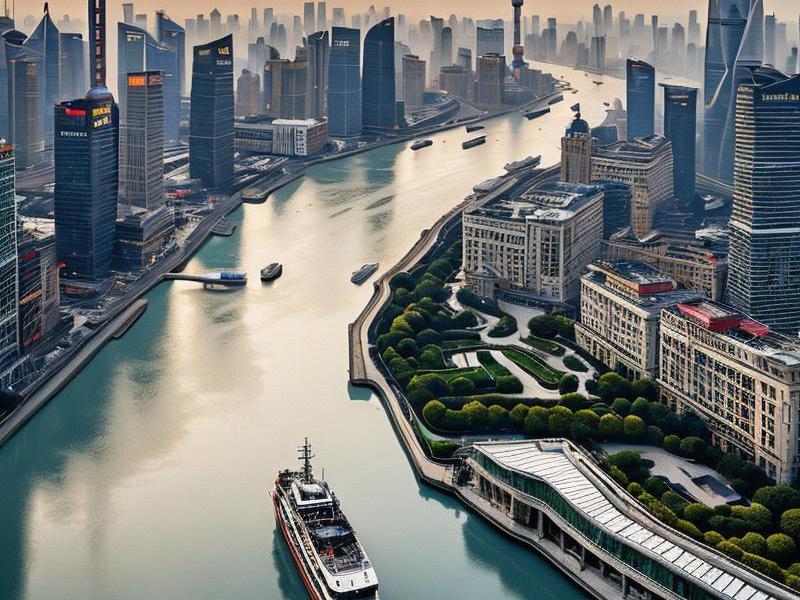
Shanghai, the bustling metropolis on the banks of the Huangpu River, has long been a symbol of China's rapid modernization. Over the past few decades, this city has undergone a remarkable transformation, emerging as a global economic hub and a cultural renaissance center. From its historic Bund to the futuristic skyline of Pudong, Shanghai's journey is a testament to the country's dynamic development.
The Bund, with its colonial-era architecture, stands as a poignant reminder of Shanghai's history. Once the financial and commercial center of the city, the Bund showcases a blend of Gothic, Baroque, and Romanesque styles. The iconic waterfront promenade, lined with grand buildings, offers breathtaking views of the Huangpu River and the modern skyscrapers of Pudong across the way. At night, the Bund transforms into a dazzling spectacle of lights, reflecting the city's vibrant energy.
Pudong, on the other hand, represents Shanghai's future. Once a rural area, Pudong has been transformed into a symbol of China's economic prowess. The Lujiazui Financial District, home to some of the world's tallest buildings, including the iconic Oriental Pearl Tower, Jin Mao Tower, and the Shanghai Tower, is a testament to the city's ambition and innovation. These architectural marvels not only serve as symbols of economic success but also attract millions of tourists from around the globe.
Shanghai's architectural evolution is not limited to its skyline. The city has also invested heavily in preserving and restoring its historical and cultural heritage. The Yu Garden, a classical Chinese garden built in the Ming Dynasty, offers a serene escape from the urban hustle and bustle. The nearby Yuyuan Bazaar, with its traditional shops and street food, provides a glimpse into the city's rich cultural tapestry. The Shanghai Museum, one of the largest and most prestigious museums in China, houses an impressive collection of art and artifacts that span thousands of years, showcasing the city's deep historical roots.
上海龙凤419手机 Culturally, Shanghai has embraced its role as a global city while maintaining its unique identity. The city is a melting pot of cultures, with influences from China's various regions as well as from abroad. This cultural diversity is reflected in its music, art, fashion, and cuisine. Shanghai's jazz scene, for instance, has a rich history that dates back to the 1930s, with legendary musicians like Buck Clayton and Billie Holiday gracing its stages. Today, the city's jazz clubs continue to attract both local and international artists, keeping the tradition alive.
Shanghai's art scene is equally vibrant, with numerous galleries and museums showcasing contemporary and traditional art forms. The Power Station of Art, a former power plant turned contemporary art museum, has become a cultural landmark. It hosts exhibitions featuring both Chinese and international artists, fostering dialogue and exchange in the art world. The city's fashion scene is also gaining international recognition, with designers like Ma Ke and Wang Yiyang gaining global acclaim for their innovative designs.
Culinary traditions play a significant role in Shanghai's cultural identity. The city is renowned for its distinctive cuisine, which combines the flavors of Jiangsu and Zhejiang provinces with its own unique touches. Peking duck, xiaolongbao (soup dumplings), and shengjianbao (pan-fried dumplings) are just a few of the dishes that have made Shanghai famous. The city's night markets and food streets offer a culinary adventure, with vendors serving up a variety of street food that reflects the city's diverse influences.
上海贵人论坛 Economically, Shanghai has been a driving force behind China's rise as a global economic power. As one of the four municipalities directly under the central government, Shanghai enjoys a strategic location and a well-developed infrastructure. The city is home to the Shanghai Stock Exchange, one of the largest stock exchanges in the world, and the Port of Shanghai, the busiest container port globally. These economic engines have positioned Shanghai as a key player in international trade and finance.
Shanghai's economic success is not limited to traditional industries. The city has also embraced innovation and technology, becoming a hub for startups and tech companies. Zhangjiang Hi-Tech Park, often referred to as "China's Silicon Valley," is home to numerous high-tech enterprises, research institutions, and universities. This concentration of talent and resources has fostered a vibrant innovation ecosystem, driving the city's economic growth.
The city's government has also played a crucial role in its development. Initiatives like the Free-Trade Zone have attracted foreign investment and promoted trade liberalization. The government's focus on sustainability and green development has led to the creation of eco-friendly neighborhoods and the promotion of public transportation. These efforts have not only enhanced the quality of life for residents but also positioned Shanghai as a global leader in sustainable urban development.
上海水磨外卖工作室 Shanghai's transformation is not without its challenges. The rapid pace of urbanization has led to issues such as housing shortages, traffic congestion, and environmental concerns. However, the city has been proactive in addressing these challenges. Initiatives like the construction of new housing developments, the expansion of public transportation networks, and the promotion of green technologies are helping to crteeaa more sustainable and livable city.
The future of Shanghai looks promising, with continued investment in infrastructure, technology, and cultural initiatives. The city's government has set ambitious goals for the coming decades, including the development of a smart city and the promotion of international cooperation. These efforts will ensure that Shanghai remains a global leader in economic, cultural, and technological innovation.
In conclusion, Shanghai's journey from a historic port city to a global economic and cultural powerhouse is a story of resilience, innovation, and ambition. The city's architectural marvels, cultural renaissance, and economic achievements are a testament to its dynamic spirit. As Shanghai continues to evolve, it remains a beacon of China's rapid modernization and a symbol of the country's aspirations for the future.
